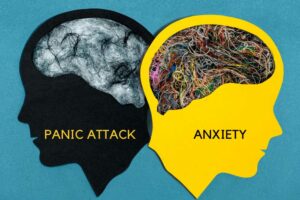Difficult and life-altering events and situations from the past or present can sometimes impact us in different ways. Sometimes, these effects can be harmful, hurtful, and can cause negative emotions and feelings that are difficult to manage.
Although it can seem overwhelming at times, you need to know that there are ways to effectively deal with trauma. Learning to cope healthily will help you maintain your mental health and improve your overall quality of life. Learning better ways to cope can also help you face addiction in your life that could be a product of your trauma.
Recognizing when and how your trauma is affecting you is an important first step toward healing. Doing so can alert you to signs that you may need additional help and support. The greater your awareness around your specific experience with trauma, the greater your ability will be to implement solutions and get to the other side of the healing process. Let’s dig a little deeper into these three concepts and get you on your way toward effectively dealing with your trauma.
How Can Trauma Affect Me?
Trauma can be a very difficult thing to deal with. Whether it’s from past occurrences, or things that have happened more recently, the impact that trauma can have on your day to day life is often exhausting. When left unaddressed, trauma can have drastically negative impacts on all areas of life, including social, professional, familial, and so on.
Often, when triggered, trauma sufferers behave irrationally, demonstrating extreme and dysregulated emotions. As a result, trauma sufferers often find themselves struggling with substance abuse and dependency, as well as other mental health issues, such as anxiety, depression, and PTSD.
Unfortunately, many trauma sufferers don’t even realize what they are suffering from. Therefore, naming your experience as trauma, and recognizing the signs and symptoms of trauma in your life are crucial first steps on your road toward recovery.
What Are Signs That I May Need Help?
Signs of trauma may vary between different people. While one person may experience and deal with trauma in one way, another person may deal with it completely differently. No two experiences with trauma are the same. However, knowing your signs and triggers can help you to recognize where you might be able to use additional support.
One common sign of trauma can be recurrent negative feelings about a person, place, or situation. These negative feelings or emotions can include anger, sadness, remorse, guilt, hurt, pain, and confusion. Emotions like these are often reflective of a previous traumatic experience.
Irritability can also be a sign of trauma. Being distant, closed off, and having difficulty talking and opening up about certain experiences can also be signs of trauma. Bad memories, flashbacks, and nightmares are common in trauma survivors as well.
If you are feeling out of control and losing hope that you’ll ever heal from your trauma, remember that you are not alone. Countless individuals have struggled with these same signs and triggers daily, and they have gotten to the other side. You can too! Take some time to seek out the many resources available to you, such as mental health treatment, therapy, and 12-step support groups. Here, you will learn ways to cope with and manage your trauma so that you can get on with your life.
Powerful Solutions for Dealing with Trauma
Several coping techniques have proven to be successful in dealing with trauma. For example, focusing on positive things can be an effective way to overcome trauma. Take the time to consciously redirect your thinking towards your good qualities and characteristics as an individual, your dreams, goals and accomplishments, and so on. Training your mind to think positively will keep you on track through those moments when you feel triggered.
Another great way to bring yourself back to your baseline when experiencing a trauma trigger is by finding a calm and relaxing space to just breathe. Doing so will help you to release stress, and can be soothing, encouraging healing and wellness on many different levels. Dialectical Behavioral Therapy (DBT) is also a proven method used for working through the effects of trauma, helping people to be more aware of their thoughts and emotions.
Keep in mind that healing and working through trauma is a process. Unfortunately, it doesn’t happen overnight. Instead, it takes time and commitment. Sometimes we have to embrace the journey in all its imperfection.
Trauma can be consuming and learning how to navigate triggers may feel like a daunting task. However, we want you to know that you don’t have to figure it all out on your own. There are people here to help, with real solutions that have the potential to change your life. Promising Outlook is an outpatient rehabilitation facility located in Riverside, California. Our goal is to help people with things like trauma, substance abuse, and mental health disorders. We believe that everyone deserves to live the life they dream of, and we are here to help get you there. At Promising Outlook, we understand the importance of assisting people with respect and being there when times are difficult. Healing takes time, and we understand the importance of this process. If you want help developing a plan to deal with your trauma, or any other problem that you may be experiencing, please give us a call at 866.980.2869.






